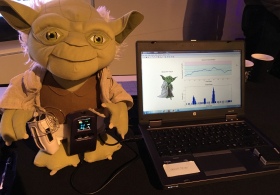Yoda visits the Science Museum
by Emma Rainbow

Bio-inspired artificial pancreas showcased at the Science Museum.
Dr Pantelis Georgiou and his team from the Centre for Bio-Inspired Technology, Circuits and Systems group took their artificial pancreas to the Science Museum as part of the ‘Antenna Live’ 3-day Event held during the Easter half term at the beginning of April.
This is the world’s first bio-inspired pancreas (BiAP) developed for the treatment of diabetes. Type 1 diabetes is an auto-immune disease that affects the pancreas in our body by destroying the beta-cells, the cells which produce the hormone insulin. This results in an extremely high concentration of a glucose, which when not regulated can lead to severe secondary complications such as blindness, kidney failure, heart disease and nerve damage and affect the quality of life of people suffering from diabetes. Type 1 diabetes currently affects 10% of the 285 million people suffering from diabetes worldwide and its incidence is increasing rapidly.
The BiAP is a closed-loop system that replicates the functionality of the biological pancreas to deliver real-time glucose control. It uses an algorithm which replicates the sub-cellular behaviour of the beta cells of the pancreas to release insulin in a physiological and is the first of its kind to be implemented in a miniature low-power silicon microchip and integrated into a small handheld device. The team uses Yoda (see below) as their interactive diabetes virtual subject to show how it works.

Around 1500 visitors came to see the artificial pancreas display at the Science Museum. Visitors were able to try out their new interactive meal library to test the effects of meals on Yoda and his pancreas.
Clinical studies in subjects with type 1 diabetes using the BiAP are currently underway. Find out more here and follow them on twitter: @Imperial_BiAP.
Article text (excluding photos or graphics) © Imperial College London.
Photos and graphics subject to third party copyright used with permission or © Imperial College London.
Reporter
Emma Rainbow
Department of Electrical and Electronic Engineering